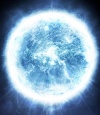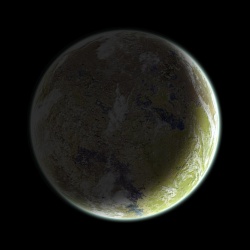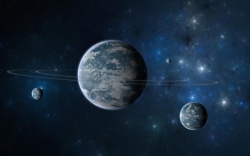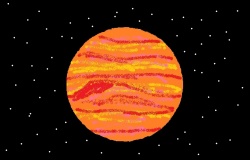The Nfolgai system is a forgotten Star system located within the Stygian Caldera in the Esstran sector of the Outer Rim Territories. The system was once a haven for the exiled Jedi of the Hundred-year Darkness, the world of Nfolgai itself being a bastion where they could gather to study Bogan and the ways of the Force. Of distinctive note within the system is the massive blue star Nsuka, the Nfolgai Belt and a single comet of note which passes through the system regularly known as Zinthin; this comet is said to be the herald of disaster on Nfolgai proper.
History
The Nfolgai system is relatively young compared to the bulk of Sith Space at a few hundred billion years, it has had an exhaustive history distinctively marked with the first incursion of the exiled Jedi from the Second Great Schism. As these first exiles found the harbour of what would become known as Sith Space, the Nfolgai system became home to the scholars and those who thirsted for knowledge amongst the newfound Sith order. While the system itself remained largely shrouded in secrecy, it is known that Nfolgai itself was home to Sorzus Syn, the Sith Lady responsible for writing the original Sith Code. Following the Empire's loss in the Great Hyperspace War, Nfolgai and the bulk of Sith Space became forgotten, lost to time and memory. It is unknown if this territory was ever reclaimed during the rise of the Sith Empire which followed during the Cold War. As time and history moved on much of Nfolgai and Sith Space became vastly unknown until the rise of the One Sith, a new Order which sought to restore the power of the Sith through subtlty and subterfuge. During their rise within Sith Space, a Sith Lord by the name of Yodb Nan was instructed to survey Nfolgai and the mausoleum of Sorzus Syn. As the Sith Lord performed as instructed the One Sith launched an offensive against their greatest foe, the Dark Brotherhood, an offensive which proved folly as the Brotherhood launched their own counter-offensive starting with the Krayiss and Nfolgai systems.
Astrography
Nsuka

Nsuka is a class A main sequence star serving as the anchor point to the Nfolgai system; it is a brilliant and massive blue star which like most class A stars emits dangerously large levels of infrared radiation causing a large majority of the innermost orbits to be devoid of life and inhospitable. While the star is young compared to most of its kin within Sith Space at only a few hundred billion years, its system is well estabished with seven individual orbits, the closest of which is a debris disk which was unable to estabilsh body with its own orbit. Given its current state and size, it is predicted by Brotherhood astrologists that this star will eventually cool and settle into the state of a Red Giant; though that is beyond the many lifetimes of a great deal of those seeking to capture the system as their own.
Nfolgai Belt
The Nfolgai Belt is a circumstellar disk or debris disk maintaining the primary orbit around Nsuka; it is comprised of a varied degree of small rocks ranging up to dwarf planets. Most of this debris was left over from the system's development and had been unable to form larger bodies or establish their own orbital pattern. As much of this orbit receives direct bombardment of Nsuka's infrared radiation, the disk itself is large enough to contain the bulk of this radiation which renders most of the objects within uninhabitable but allows planets such as Nfolgai and beyond to support life. Local scans confirm large mineral deposits within numerous bodies within the belt, but also confirm absolutely zero life.
Orbit Two
- Main article: [[|]]
Nfolgai

|
| Nfolgai
|
|
None
|
|
21 Hours
|
|
212 Solar Days
|
|
Terrestrial
|
|
13,000 Km
|
|
Type I (Breathable)
|
|
Arid
|
|
1.0G
|
|
Mountainous, Barren, Jungle & Swamps
|
- Ancient Sith Mausoleum
- Natural Fission Reactor
- The Render crash site
|
|
|
|
Basic
|
|
1.1M
|
|
Food, Technology
|
|
Minerals
|
|
|
- Main article: Nfolgai
Nfolgai is a treacherous, tidally locked world diseased with the Dark Side of the Force. Because the planet is tidally locked it only presents it's southern hemisphere to the local star of Nsuka.
Due to the planet's steep axial tilt the northern hemisphere receives little light, thus making it relatively barren of plant life and largely desolate with sweeping mountain ranges; volcanism is rampant and geothermal sites are relatively abundant. The lack of flora and active tectonic plates make the northern hemisphere ideal for mining endeavors due to its interestingly relative abundance of heavy metals and radioactive elements. At least one site in the northern hemisphere acted as a sort of natural fission reactor in the past where water penetrating hydrothermal veins of uranium and thorium has acted as a neutron moderator and the system has cycled for over 1 million years naturally. This unique and natural erosion has created an area of easily mined enriched uranium ore.
While its rather devoid of life in the north, the southern hemisphere is dotted with jungles, swamps and eroded mountain ranges. The flora of the southern hemisphere contains exceptionally high metallic content similar to the planet of Myrkr; it is this same metallic content which renders radar and scanners useless.
Located in the jungles of the southern hemisphere, Sorzus Syn's mausoleum remains a mystery within Sith Lore. It is unknown if the great Sith Lord was ever entombed within the facility or if it merely served as a house of power for her meditations. Protected from aerial approach, the mausoleum is surrounded by heavy forest canopy and is carved out of the base of a mountainside. A great expanse within the mountain has been removed to house focusing chambers, tombs and the private alchemical studies of Sorzus Syn and other Sith Lords.
The mausoleum is defended by the enraged and mutated descendants of the slaves who erected the structure. Mrlssi and Draethos prowl the jungles surrounding the temple and crawl through unknown passages within. Armed with rudimentary force powers, telepathy, and crude weapons the Draethos provide the greater challenge of the indigenous aggressors. Additional traps and ancient wards protect the mausoleum's interior. Rumors exist of other abominations created to destroy even the greatest of Force Users looking to steal Sorzus Syn's secrets.
Discovered in 35 ABY by the One Sith, the Interdictor-class Destroyer Render lies in the northern hemisphere of Nfolgai. The cause of the destroyer's crash on the planet's surface remains unknown, but the Captain of the ship did an exceptional job in preserving much of the structure as it crash-landed.
Abandoned over 3600 years ago, the Render is permanently crippled. The vessel's fate is etched into the surface of Nfolgai. Destroyed power cores, a fractured hull, and over 3,000 years of time have turned the ship from a mighty destroyer to a vast warren of Mrlssi descendants. Maddened by the Force, the bird-like creatures defend their home with an approach only definable as insanity.
One Sith expedition teams have breached the destoyer's surface hunting for artifacts and have returned with the belief that the Render does possess designs for ancient weaponry and armor.
While originally intended as a world for scholars and scientists, as the events of the Great Hyperspace War began to falter the planet soon shifted its attention towards being a tomb world for the Sith who would remain behind; trying to preseve their history and work for future generations who would inevitably follow in their footsteps.
Given the planet's historical significance, the One Sith themselves were present on Nfolgai since at least 35 ABY searching for anything of value to their cause. In the following year the planet became a target of the Dark Brotherhood following a failed attempt against them by the One Sith. The system itself was highly contested not just between the waring factions but also between Clan Naga Sadow, House Plagueis, House Scholae Palatinae and House Tarentum of the Brotherhood; each securing their own landing zones and Forward Operational Bases in different sectors on the planet. Their cooperation during the operation had been fragile at best with limited outbursts outside each encampment, but overall these frustrations did not disrupt their primary mission. Such cooperation was seen trying to claim the Mausoleum, in regular patrols of the system and in the orbital blockade preventing One Sith reinforcements.
Auberon

|
| Auberon
|
|
3: Leona, Phoebe & Selene
|
|
26 Standard Hours
|
|
537 Standard Days
|
|
Terrestrial
|
|
147,628 km
|
|
Type I (Breathable)
|
|
Temperate
|
|
1.5G
|
|
Aquatic (saturated hydrosphere)
|
- Auberon Complex Ruins
- Leona Facility Ruins
- Phoebe Chamber Ruins
- Selene Mausoleum Site
|
|
|
|
Ancient Sith Empire
|
- Main article: Auberon
Auberon is a massive aquatic world with a highly saturated hyrdrosphere and is marked by its distinctive rings and trio of satellites nicknamed the three sisters by the system's recent cartographers. The satellite moons themselves are unusually large and could be fair to be called dwarf planets, each slightly larger than the last though all are dwarfed by their companion. While aquatic worlds on their own are not unusual, the quartet of them in a small cluster is and their mysteries are still yet to be uncovered. While the current conditions of Auberon and its satellites is still being uncovered by specialists it is known that the likelihood of colonizing them is highly unlikely.
A beautiful and serene world, Auberon is captivating with its distinctive rings and orbiting children. It has clean and crystal clear waters which are full of various aquatic life while its surface undergoes a full gambit of weather conditions; ruins of a stilted city bear markings of erosion from powerful storms to frozen surfaces. Designated as the "Complex" Ruins, these cities have been identified as former habitation and standard facilities for the Sith Empire. Unusually, these markings are not from the Ancient Sith Empire but instead from the Sith Empire of the Cold War, these installations believed to have been some form of research complex for the Imperial war-machine.
The largest moon of Auberon has been designated Leona and it is said that she has a nasty temper. Though it is highly aquatic the moon itself rampant with volcanism and its surface temperatures nearing a boil some days, couple this with its higher than normal rotational velocity causing a higher gravitational pull and the Leona is strife with violent storms causing turbulent skies and rough seas. Amongst the sisters, Leona is one of the fastest to complete her orbital period of Auberon and due to her violent climate also bears ruins from the days of the Sith Empire. These ruins are speculated to have been a focusing facility, both to draw energy from the violent winds and seas as a generator as well as for the Sith themselves to draw from the chaos surrounding them.
The next smallest moon bears the designation Phoebe and unlike her larger sister, is almost as calm and serene as her companion. Nearly identical to Auberon in many ways the only major difference between the pair is that Phoebe has a much solar rotational velocity than normal which results in a lower gravity than the other moons or planet and less frequent winds or storms. While sometime called an eerie calm, this peculiarity seems to have been utilized by the Sith Empire for meditation chambers, the ruins themselves almost lost to the seas from erosion but still bearing similarities to modern chambers.
The third and final moon is known as Selene, her orbital frequency the slowest of all the sisters to the point that she spends a bulk of her time in the shadow of Auberon or her sisters. This unique trait has meant that while her rotational velocity is average, her surface is desolate tundra nearly coated in ice. The ice and snow are so prevalent on Selene that her oceans are nearly covered in a thick sheet of ice. This solitary and desolated surface was selected by the Sith Empire for a Mausoleum, a facility which itself has practically frozen over from the neglect leaving Brotherhood specialists all the more intrigued by what secrets could lie within.
When the One Sith launched their expeditions on Nfolgai around 35 ABY, Auberon found itself left entirely alone as the Sith themselves were following information that had been within journals pertaining to the Sorzus Syn and her mausoleum. The following year Auberon and its moons found themselves utilized as a staging area for the Brotherhood's temporary refit and repair stations largely from its proximity to Nfolgai and its size, the larger size allowing the numerous ships of the combined invasion fleet to remain hidden from sight and the ships lurking within Auberon's rings could remain cloaked from sensor sweeps as the various particles would send false positives.
Orbit Five
- Main article: [[|]]
Necroia

|
| Necroia
|
|
Nfolgai
|
|
1
|
|
13 hours
|
|
gas giant
|
|
118,100km
|
|
approx. 1.5g (at the core)
|
|
gas giant, clouds
|
|
Tibannucks, velkers, rawwks, and beldons
|
|
Tibanna gas
|
|
Ancient Sith Empire
|
- Main article: Necroia
Necroia is a Gas Giant with a metallic core. It is unknown which metal the core is comprised of because the electromagnetic field of the planet grows in strength as distance to the core shortens. This causes electronic devices to short and malfunction, which has killed many expeditions. The inhabitable area of the planet stays a moderately comfortable temperature of sixty-five degrees and is habitable to humans, as it is comprised of Oxygen.
Orbit Seven
- Main article: [[|]]
Zinthin
Zinthin is...
Trivia
- The information gathered here was through special reconnaissance completed by members of the Naga Sadow Conclave